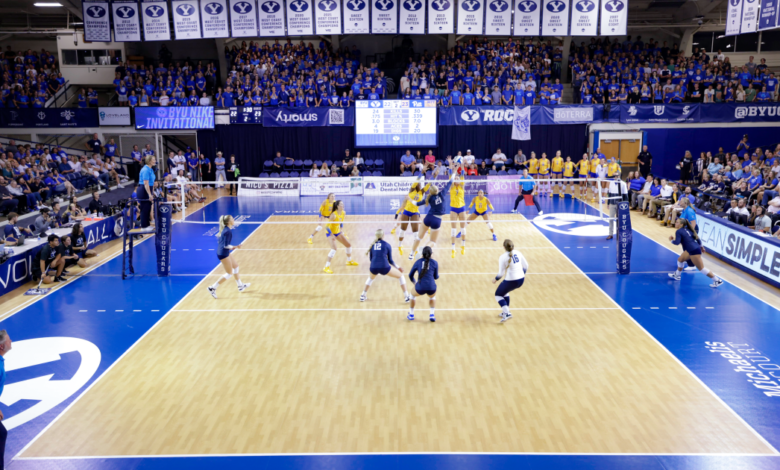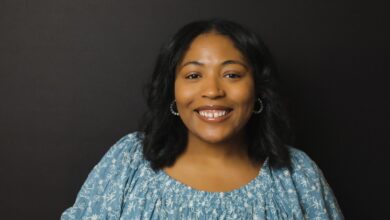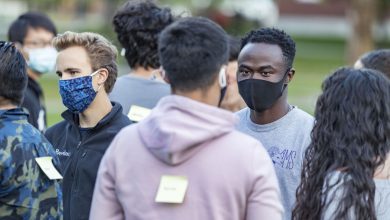A Duke Volleyball Player Said BYU Fans Shouted Racial Slurs. An Investigation Found No Evidence.

[ad_1]
The allegation was shocking, and the outrage that followed understandable. Rachel Richardson, a Black player on Duke University’s women’s volleyball team, said she was “racially heckled” during a match against Brigham Young University in late August. Those “slurs and comments grew into threats” directed at her and fellow Black players, she wrote in a statement posted on Twitter. She blamed BYU coaches and officials for failing to intervene.
In the more than two weeks since the match, though, doubts about her account began to emerge. No video or audio was found capturing slurs or threats. No witnesses came forward to back up her story. It seemed no member of her team, which issued statements supporting her, heard anything during the match.
Now the BYU athletics department has issued a statement saying that an investigation had “not found any evidence to corroborate the allegation that fans engaged in racial heckling or uttered racial slurs at the event.” BYU officials examined security footage and raw video and audio from the match broadcast, and interviewed more than 50 people in attendance. “We renew our invitation for anyone with evidence contrary to our findings to come forward and share it,” the statement said.
Shortly after BYU released the results of its investigation on Friday, Nina King, vice president and director of athletics at Duke, put out a statement calling the volleyball players “exceptionally strong women” who represent the university with “the utmost integrity.” “We unequivocally stand with and champion them, especially when their character is called into question,” King said in the statement, which concluded with the hashtag #HateWontLiveHere. (Through a spokesperson, King declined an interview request on Friday.)
The BYU investigation also found no evidence that the fan who had been singled out by Duke for yelling slurs and was subsequently banned from future athletic events at BYU had, in fact, said anything racist or made threats. The ban was lifted, and the university apologized “for any hardship the ban has caused” to the unnamed fan.
The allegation almost immediately took on a life of its own. The statement Richardson tweeted has been liked nearly 30,000 times. LeBron James tweeted in support of her. Essays were published connecting the allegation to Mormon history and noting that less than 1 percent of BYU’s student population is Black. What was supposedly said by a fan, or possibly several fans, was treated as indicative of a deeper, unaddressed problem at the university. The women’s basketball team at the University of South Carolina at Columbia backed out of scheduled games against BYU; the team’s coach, Dawn Staley, said in a statement that she had to “do what’s best for my players and my staff.” The BYU women’s basketball team said on Twitter that it was “extremely disappointed” by Staley’s decision.
Many others weighed in. Duke’s president, Vincent E. Price, wrote in a statement that he was “outraged by the racist slurs and taunts.” Gov. Spencer J. Cox of Utah, a Republican, declared that he was “disgusted that this behavior is happening.” (The tweet has since been deleted.) The commissioner of the Atlantic Coast Conference, Jim Phillips, wrote that the ACC was “outraged at what took place.” BYU apologized to Duke and to its volleyball team, and made changes to some of its protocols, including adding a video message before volleyball matches to remind fans of the university’s code of conduct.
Then questions began to be raised on social media. Video of the match didn’t appear to confirm Richardson’s story. An August 30 article in the Cougar Chronicle, a student publication that bills itself as “news for the BYU student, without the radical left,” dissected the allegations. The article quoted an anonymous source within the BYU athletics department saying that “her story doesn’t add up” and that the university had been unable to confirm that the fan who was banned had said anything racist — a conclusion that the statement issued by the university supported. Theories proliferated as well, including that perhaps Richardson had misheard “cougar” as the N-word.
On Friday, BYU didn’t call Richardson’s experience of the match into question but reported only that it had failed to corroborate what she said she heard. (Attempts to reach Richardson and her family for comment on Friday were unsuccessful.) “Our fight is against racism, not against any individual or institution,” BYU’s statement said. “Each person impacted has strong feelings and experiences, which we honor, and we encourage others to show similar civility and respect.” Likewise, the statement from King, Duke’s athletics director, doesn’t take a position on whether the allegations are true but instead says that she supports the players and “believes in respect, equality, and inclusiveness.”
[ad_2]
Source link






